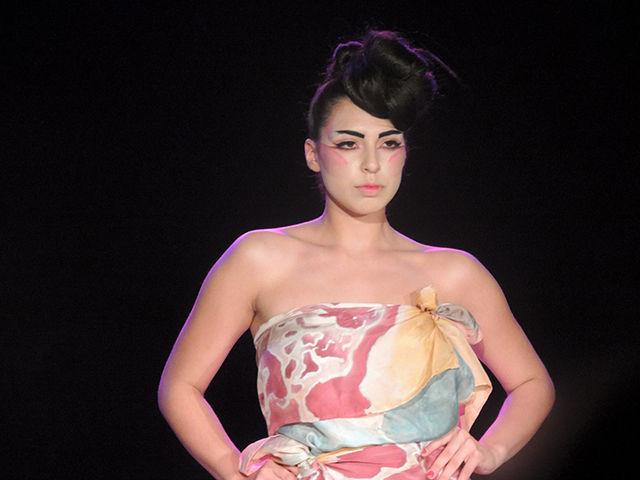The third annual Eco-Fashion Show and Conference presented by Redress Raleigh was held last Friday and Saturday, hosted between the Lincoln Theatre and Contemporary Art Museum. Redress Raleigh is an event planning and marketing company that focuses on sustainable designers.
Founded by NC State graduates Beth Stewart and Mor Aframian, and designer Jamie Powell, they advocate for a more socially and environmentally responsible world. With their fashion show and conference, they are able to showcase designers who use eco-friendly fabric or resources in their collections and educate people on sustainability and fashion.
Seven designers were showcased this year with a variety of women’s, menswear and some children’s wear. Featured designers ranged from Stephanie Trippe, owner of Pretty Birdie Co., who created modern and stylish looks all made from hemp textiles, to Kim Kirchstein, owner of Leopold Designs, who showcased an exotic and bold resort-wear collection with summer dresses in gorgeous orchid-inspired prints combining all natural silk, soy wax and low-impact dyes.
One of the designers, Allison Bowles, is a graduate student at NC State in product development and minoring in business. Bowles founded Artemis Clothing Co., a small brand of women’s dresses designed for the independent dreamer who values locally made products.
“The silhouettes were also inspired by things I like to wear, that are easy to wear,” Bowles said.
According to Bowles, her target consumer is not defined by age.
“I design for any woman who’s easygoing, free spirited and embodies Artemis, an independent goddess,” Bowles said.
All prints were locally printed.
“It’s a lot less waste,” Bowles said. “I also use overstock fabric [unused fabric designers toss], and produce in small batches. I manufacture and sell my products locally as well.”
All the designers’ collections featured eco-friendly material and/or processing seeking to make reusing fashionable. The conference also included various lectures and networking for industry attendants and students.
Tom Snyder, industry liaison at The Center for Advanced Self-Powered Systems of Integrated Sensors and Technologies (ASSIST), spoke as a panelist at the fashion and technology presentation about what kind of technology we would see in fashion in 10 years.
“[In regards to] health and activity sensors in undergarments and clothing, we’ll stop using the term ‘wearable’ in regards to adding tech to garments,” Snyder said. “That term will go away once it becomes second nature.”
According to Snyder, sensors will soon be commonly embedded in certain garments such as shoes and undergarments. ASSIST focuses on improving societal health through development of nanotechnology-based wearable sensors that correlate environmental and physiological signals to provide information for people to stay healthy.
Jesse Jur, an assistant professor of textile engineering and chemistry, also spoke at the panel. Most of his research focuses on understanding how wearable systems can be designed to improve on their potential in creative platforms for energy harvesting and monitoring of a person’s environmental and physiological states.
“There are two ways wearable systems designed into textiles can help people monitor their environmental state: direct and indirect measurement,” Ju said. “First, you can apply sensors [like gas, temperature, humidity] into textile parts that are exposed to the environment. Second, you can monitor health vitals that are an indication of how your body is stressed by the environment. A good example here is hydration sensing.”
Cynelsa Broderick, also a panelist at the discussion, talked about her role as the education and outreach coordinator in the NC State University Sustainability Office.
“We’ve been partnering with different student organizations to increase awareness of sustainability,” Broderick said. “The natural resources we need to live are, in many cases, diminishing. One of the reasons it’s important for students to be sustainable is to preserve resources for the future.”
There have also been educational opportunities on campus such as a 2014 event called “If Your Clothes Could Talk” that included a panel of textile industry experts discussing some of the key issues in advancing the sustainability of textile production. The NC State College of Textiles addresses how people see sustainability and eco-fashion with an active research in developing more efficient and less wasteful textile production.
“These innovations could help transform the entire fashion and textile industry,” Broderick said.








